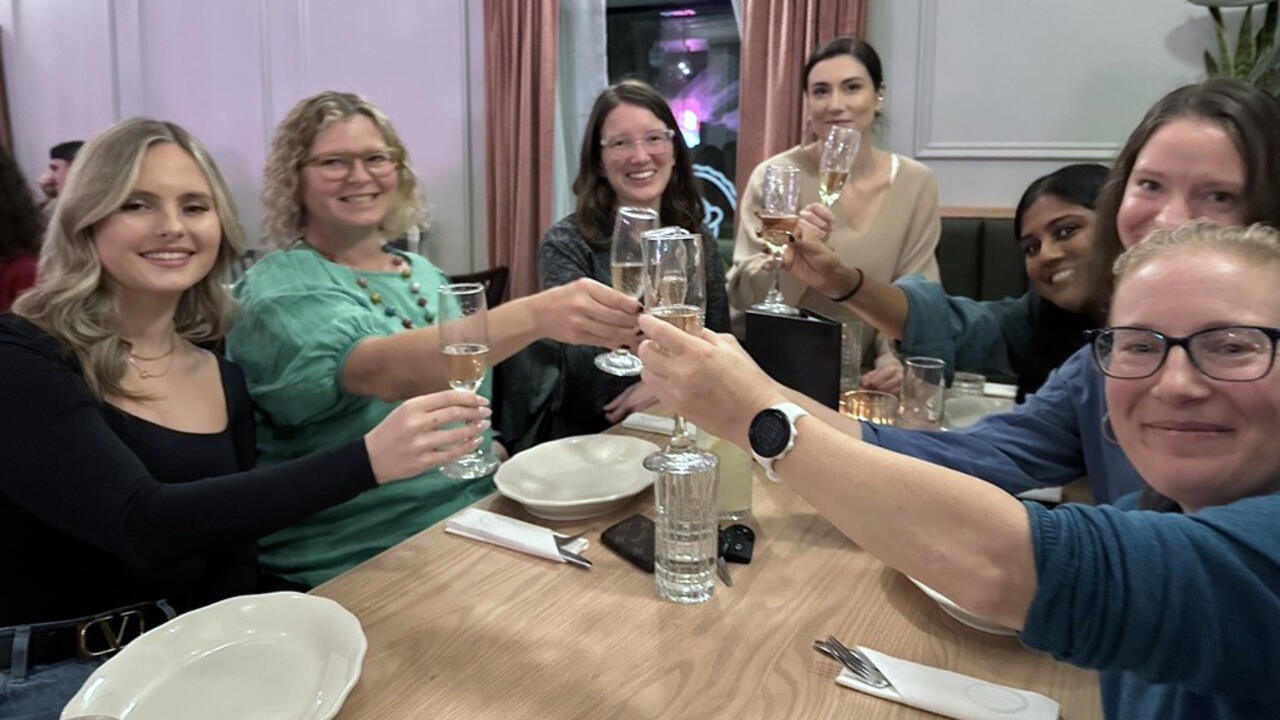
Waterloo public health students win world case competition
Prism Consulting team’s plan focuses on evaluating a Clean Start Africa program

Prism Consulting team’s plan focuses on evaluating a Clean Start Africa program
By Faculty of Health“As a prism reflects and refracts the light that passes through it, we are dedicated to evaluating the full spectrum of your program’s opportunities, challenges and potential,” wrote a team of Waterloo students who won first place at the most recent World Evaluation Case Competition with their entry.
Their task was to develop a tailored evaluation proposal for a Clean Start Africa program called Circles of Healing, whose goal it is to psychologically support and reintegrate women and children affected by imprisonment.
 The prism approach guided their evaluation plan as they competed with teams from 14 other countries. The group, who call themselves Prism Consulting, is made up students from the School of Public Health Sciences: Sarah Sousa, McKenna Szczepanowski, Jiselle Bakker, Thepikaa Varatharajan and Amanda Demmer. They previously had won the Canadian Evaluation Society Student Case Competition, earning them the right to represent Canada in the world competition.
The prism approach guided their evaluation plan as they competed with teams from 14 other countries. The group, who call themselves Prism Consulting, is made up students from the School of Public Health Sciences: Sarah Sousa, McKenna Szczepanowski, Jiselle Bakker, Thepikaa Varatharajan and Amanda Demmer. They previously had won the Canadian Evaluation Society Student Case Competition, earning them the right to represent Canada in the world competition.
“The cases at the World's level differ drastically from the Canadian competition as they focus on non-westernized programs and contexts,” Szczepanowski says. “We apply more of a monitoring and evaluation lens using culturally appropriate methods and approaches.”
In the Circles of Healing case, the team proposed evaluating how the activities addressed the needs and priorities of imprisoned and formerly imprisoned women in Kenya, how well the activities were being implemented and what progress had been made toward the goal of fostering successful reintegration of formerly imprisoned women into society. Female offenders made up 13 per cent of the total prison population in Kenya in 2020.
“Throughout the proposal, we discuss our understanding of the program and the context within which it operates, what our main goals of the evaluation are, why it is important to evaluate the program, the evaluation design and approach, data collection methods that we will use, how we plan to disseminate our findings, a timeline and potential challenges we may encounter along with mitigation strategies,” Szczepanowski says.
Their evaluation proposal addressed several key items, including how comprehensively the activities of the program were addressing the needs, priorities and rights of imprisoned and formerly imprisoned women in Kenya, how well the activities of the program were being implemented within and outside of prisons and to what extent progress was being made toward the program objective of fostering successful reintegration by reconciling imprisoned and formerly imprisoned women with herself, her family and the community.
Varatharajan says, “Our team always tried to maintain a positive attitude. Recognizing that we had given our best within the seven-hour timeframe, we hoped that our efforts would yield positive results.”
Ultimately, they did. For Demmer, the news that they had won was exhilarating. “It's likely the one and only time in my life I'll be able to say I represented Team Canada and brought home a gold!” she says.
The team members are grateful for coaches Drs. Jennifer Yessis and Kelly Skinner for their guidance and to Dr. Scott Leatherdale, who is the PhD supervisor for three of the five students.
Case competitors from the School of Public Health Sciences have traditionally done well in the national competition, but this was the first time a team from Waterloo competed in and won the World competition.
Every year, the World competition offers student teams from around the world the opportunity to analyze a non-profit or government case and propose an evaluation plan of the program, including recommendations for action based on their understanding of the key issues. Winners are assessed by a panel of judges.
Students benefit from these competitions by learning more about program evaluation through real-world cases, giving them hands-on experience of what a career as an evaluation professional could look like.

Read more
Here are the people and events behind some of this year’s most compelling Waterloo stories

Read more
Irfhana Zakir Hussain works to strengthen Waterloo’s capacity to withstand and recover from climate-related health crises

Read more
Meet the 14 exceptional students representing Waterloo’s newest grads
The University of Waterloo acknowledges that much of our work takes place on the traditional territory of the Neutral, Anishinaabeg, and Haudenosaunee peoples. Our main campus is situated on the Haldimand Tract, the land granted to the Six Nations that includes six miles on each side of the Grand River. Our active work toward reconciliation takes place across our campuses through research, learning, teaching, and community building, and is co-ordinated within the Office of Indigenous Relations.